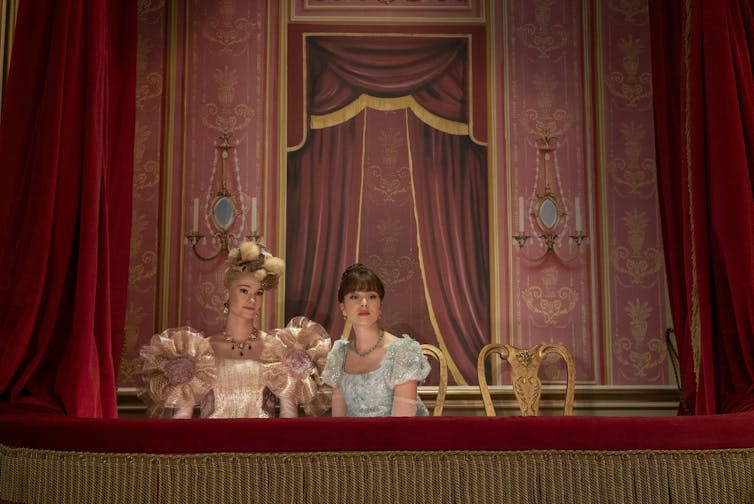Note this piece contains spoilers for seasons two and three of Bridgerton
Netflix’s Regency-inspired romance series Bridgerton has returned in all its garish glory (at least if you’re a Featherington) for the show’s much-anticipated third season.
Transporting viewers once again into the glittering world of high society scandal, gossip and romantic intrigue, this latest instalment shifts the focus to Penelope Featherington (Nicola Coughlan) and Colin Bridgerton (Luke Newton), and their will-they-won’t-they courtship.
Based on Julia Quinn’s bestselling historical fantasy novels, this season is the first to depart from the reading order of the books. Quinn’s third novel An Offer From a Gentleman – which chronicles the second eldest, Benedict Bridgerton’s story – is passed over, at least for now, in favour of the friends-to-lovers narrative arc in Romancing Mister Bridgerton, the fourth novel.
Unlike the steamier, earlier seasons, we see the contours of a slightly more serious, mature, and emotionally complex Bridgerton storyline emerge in the first four episodes of season three – one that is based around identity, self-acceptance, and romantic attachment.
With its usual intoxicating blend of drama and Regency opulence, Bridgerton’s latest chapter maintains the series’ signature vibrancy and irreverence. Nevertheless, changes are afoot.
More gossip, scandal and intrigue
At the end of season two, we saw Penelope reeling from two devastating heartbreaks.
The notorious Lady Whistledown, the society scandal writer, has propelled each season forward as narrator (voiced by Julie Andrews). In season two, the audience was brought in on the deceit as her identity was revealed to be none other than Penelope Featherington.
As the ruse became more complicated, we watched as Penelope’s attempts to hide her identity lead her to betray her friend Eloise Bridgerton. The pair fall out as Eloise discovers who Whistledown really is. Moments after, Penelope is dealt a second blow when she overhears Colin Bridgerton (for whom she has harboured a crush) laughing at the idea he would ever court her.
This is the state of affairs for the poor Miss Featherington as she enters her “third year on the marriage mart with no prospects to show for it”.
In the hierarchical world of early 19th century society, matrimonial alliances were rarely guided by matters of the heart. For fashionable society, marriage was a pragmatic undertaking, vital for securing financial stability and status.
Unmarried women who didn’t possess their own fortunes, like Penelope and Cressida Cowper (Jessica Madsen) – also entering her third season – were considered a financial burden and an embarrassment to their families. It brings to mind the brilliant line Emma Thompson wrote for Charlotte Lucas in the 2005 film adaptation of Pride and Prejudice:
I’m 27 years old, I’ve no money and no prospects. I’m already a burden to my parents. And I’m frightened.
Stigmatised, dependent and relegated to the peripheries of society, the spinster was heavily criticised in William Hayley’s A Philosophical, Historical and Moral Essay on Old Maids (1785), which presented many of the stereotypes about spinsters that persisted in the early 19th century.

Rather than risk being stuck “on the wall forever” and under her mother’s control, Penelope turns her attention to finding a suitable husband.
She dispenses with her citrus-coloured gowns and gives herself a makeover by adopting the latest Parisian fashions. While such costume flourishes in period pieces often play with notions of historical accuracy, Penelope’s Regency glow-up signals her marriageability. In the 19th century, an upper class woman’s dress and outward appearance played a crucial role in attracting a suitable suitor.
She even enlists Colin’s help (the most eligible bachelor of the London season) to find a husband, but the plan soon goes awry. Cue a tale of seeing someone who’s always been there differently.
But while Colin and Penelope’s slow-burn romance takes centre stage, season three also sets its sights on the developing characters and courtships of the other Bridgerton siblings.
A maturing drama
There will be much joy in the return of proto-feminist and firm fan favourite Eloise Bridgerton. Still uttering her witty quips, we see a slightly more mature Eloise this season. Appearing to eschew her more radical ideals, she grudgingly accepts her need to enter into society and marry well.
At the start of the show, she admits that she is reading and enjoying Jane Austen’s romance novel Emma (first published in 1815). “The writings I read before of women making their way outside society – those were the romances. This book has humour and truth, the pains of friendship. It is altogether more probable,” she remarks.
The reference to Emma reinforces the many connections that have been drawn between the show and Austen’s Regency novels, which are similarly preoccupied with marriage and social status.

Like the voice of Lady Whistledown narrating the dramas of high society in Bridgerton, Emma’s omniscient, satirical narrator delights in charting the romantic intrigues and social missteps of the titular Emma Woodhouse.
And although it is Colin and not Eloise who will attempt to act as matchmaker, there are clear parallels between the two independent and (at least initially) marriage-averse female protagonists.
As Emma declares:
I have none of the usual inducements of women to marry. Were I to fall in love, indeed, it would be a different thing! But I never have been in love; it is not my way, or my nature, and I do not think I ever shall".
Like Emma, will Eloise come to see that romance and love aren’t that bad after all?
Bridgerton season three is everything it promised to be. Balancing frothy romantic fantasy with issues of female autonomy and self-actualisation, it is truly engaging viewing.

